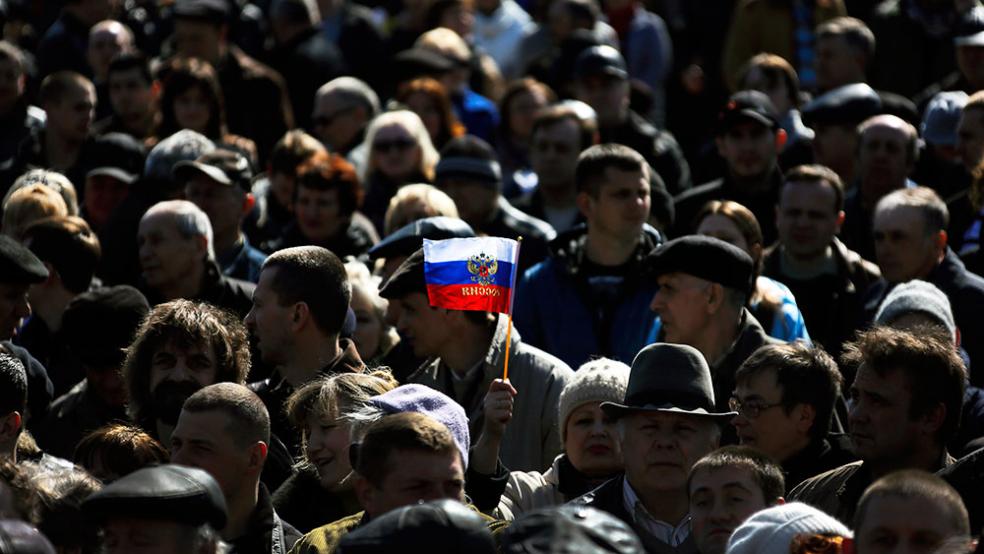Crunch time in Ukraine approaches. This is not simply because the country’s east and south are “essentially at war,” as Vasyl Krutov, the general who leads what the provisional government in Kiev insists is its “anti-terror” operation, acknowledged on Sunday.
The greater worry emerging among the savviest analysts at the nexus of financial markets and geopolitics is the potentially catastrophic impact of the sanctions Washington and the European capitals now press upon Russia. “This could end in a massive, massive mess,” Ken Courtis, the financier and former Goldman Sachs chief in Tokyo, told me in a note the other day.
Related: How Obama’s White House Lost Ukraine in a Few Simple Steps
Courtis refers to what he calls “the silent sanctions” induced by the official measures so far taken against prominent Russian executives, and the threat of direct embargoes against the companies they head. Western banks have already begun cutting credit to Russian borrowers, he says, “and in some cases have refused to roll over loans as scheduled.”
The consequences here could prove unintended times 10, as damage spreads beyond Russia to the Commonwealth of Independent States, as the remains of the Soviet Union are commonly called.
“If this building credit crunch continues, and it is day by day becoming more intense, it will deeply destabilize Russia, and all of the CIS,” Courtis wrote in the most unsettling e-mail of my weekend. “Together with a dysfunctional and now largely ungovernable Ukraine, the financial and economic risks beyond the region are obvious. Already, economic expectations for Eastern Europe are being slashed, and caution flags have gone up for Western Europe, as CIS importers are having increasing difficulty making payment to their EU suppliers.”
Related: For Putin, Invading Ukraine Augers Russia’s Destiny
The irony here is that the intended goal of the sanctions strategy—to force Moscow to acquiesce as the Kiev government attempts to lurch toward Europe—are nowhere in sight. The worst of all outcomes starts to take shape: Potentially drastic economic damage, a lot of it self-inflicted by the West, and impotence on full display as Russia presses what looks like a coherent case for a solution that recognizes Ukraine’s divisions and goes beyond the provisionals in Kiev.
As of now, it is hard to see how this crisis can get better before it gets worse. “We are not far from a civil war,” Timothy Ash, the emerging-markets economist at Standard Bank in London, told Bloomberg over the weekend. Ash sees "little evidence of any de-escalation in the conflict in Ukraine and little evidence of any back-room efforts to broker a solution.”
Ash might be wrong about the back room doings. Secretary of State Kerry said Saturday that during another telephone exchange with his Russian counterpart, Sergei Lavrov, the two diplomats are considering “how to find a way forward.” Encouragingly, the avenue now to be explored is mediation led by the Organization for Security and Cooperation in Europe, of which the U.S., Russia, the Europeans, and Ukraine are all members.
A Russian diplomat, it is worth noting, was instrumental in getting anti-Kiev forces to free the seven OSCE officials held in Slavyansk for the past couple of weeks. This happened on the same day as the Kerry-Lavrov call.
Related: 12 Things You Don’t Know about Ukraine
Kerry and Lavrov have a constructive relationship, but this is a sliver of light at this point, not more, and timing is going to prove of the essence.
First, it is impossible now to imagine the International Monetary Fund releasing any part of the $17 billion in funds it recently announced as its bailout plan. Apart from the wasted lives, this is one price of Kiev’s failure to capture the hearts and minds of those to its east.
Second, the other cost of the violence in the east is that elections due May 25, intended to put a legitimate government in place, simply cannot be held on schedule. It is sheer folly—and Moscow is right again here—for the Obama administration to insist these polls take place under current conditions.
There are two obvious questions. How do you bail out a country when there is no one there to take the check? If no one is there to take the check, how quickly would Ukraine’s economy collapse and how loudly would the echoes sound throughout Europe?
Some concern among political leaders about the “silent sanctions” syndrome is already emerging. Fitch, the credit-rating agency, thinks Treasury is limiting its sanctions regime in response to concerns voiced by holders of debt issued to Russian companies such as OAO Rosneft. The sanctions tag CEO Igor Sechin but not the influential oil producer itself.
Related: Why the U.S. and Europe Can’t Stop Putin in Ukraine
“We’ve heard quite a lot of anecdotal evidence that there’s actually a lot of consultation with big investors and bondholders in terms of what sanctions might be imposed by the U.S.,” James Watson, a managing director at Fitch, told reporters Friday in London.
Will such parsing prove an adequate defense against the kind of economic cataclysm the sanctions strategy and the dysfunctional regime in Kiev could, in combination, set in motion any time now? Ken Courtis had a curious thought on this.
“Dream on, dream on, dream on,” he said.
Top Reads from The Fiscal Times:



